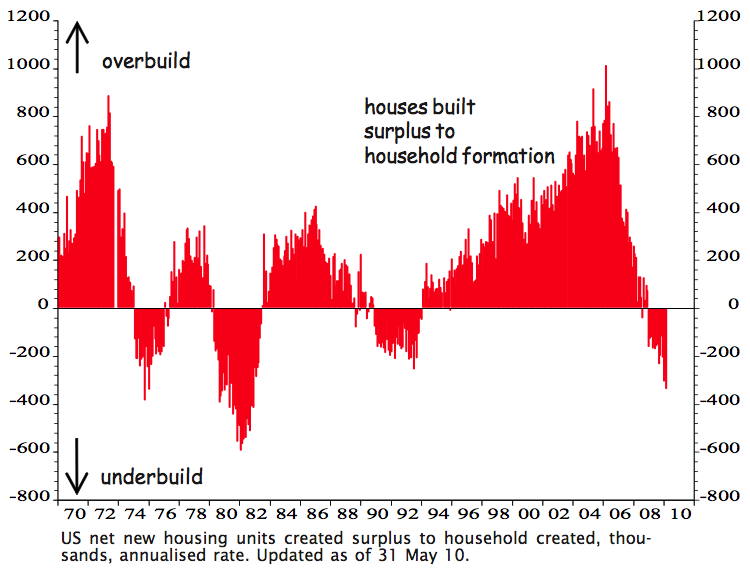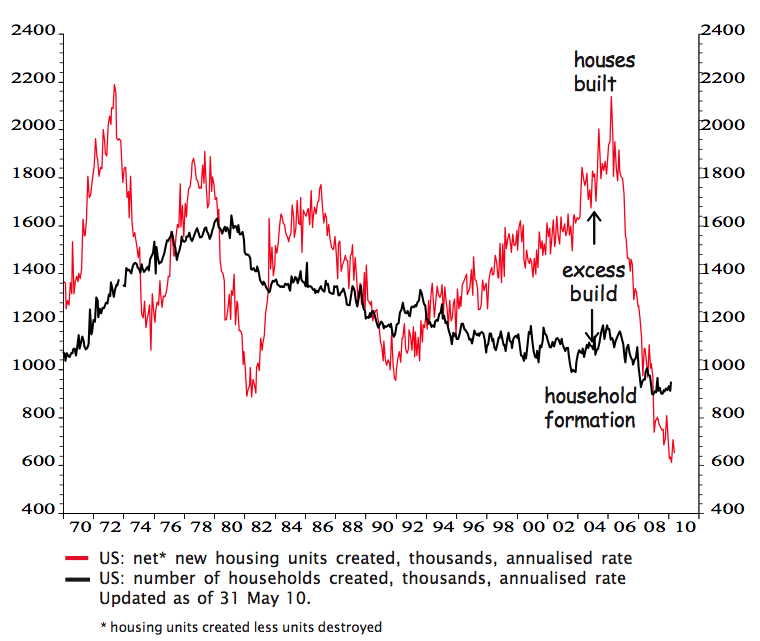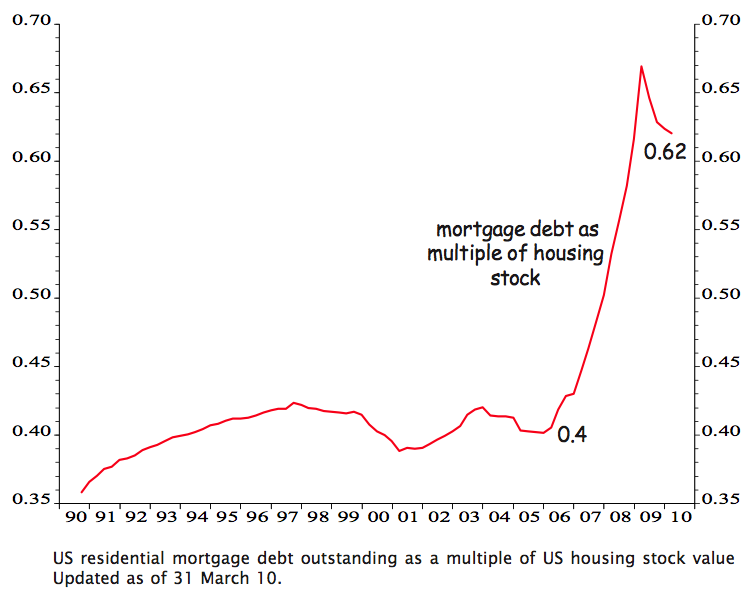| 作者 |
 【近期看到一些数据】朋友想炒房地产的底,开始在FL,AZ,CA等地方抄底【乐观不乐观的态度】ZT 【近期看到一些数据】朋友想炒房地产的底,开始在FL,AZ,CA等地方抄底【乐观不乐观的态度】ZT |

 |
The Fifth Season
[博客]


头衔: 海归中将
声望: 博导
加入时间: 2008/09/12
文章: 4241
海归分: 567427
|
|
|
作者:The Fifth Season 在 海外房地产 发贴, 来自【海归网】 http://www.haiguinet.com
投资的话,很多地方有 POSITIVE现金流就可以。即使房子不升值,你的30年收益是这个
房子减去首付。呵呵
如果自住,因为利息抵税,绝大多数地区比租房划算。
例如:$250k house, the rent is $1500, loan $200k. Then the monthly mortgage
is about $1k, plus property tax about $300, other 300. 但是其中有1000左右抵
税,其实支付了600左右。还有300是进入EQUITY,是储蓄,真正没有了的是1000+300+
300-400-300=900左右,比你租房子便宜。
如果这个房子投资,是NEGTIVE的现金流,投资收益不大。但是在很多的地区,150K的
房子就可以租出1500,这样就有正现金流,就有不错的投资收益了。
买房子最大的不好是:流动性差,如果搬家换工作,就亏了
如果买在了高峰当然就没有那么好了。加州有的地方250K的房子以前卖400K.这样就不
如租房便宜了。就只有等增值了。
【 在 onehouse (whitehouse) 的大作中提到: 】
: 看到班上有些朋友想炒房地产的底,开始在FL,AZ,CA等地方抄底。我近期看到一些数据
: ,不禁对未来10年美国房地产不是很抱乐观态度。
: 1.从1975-2000年,除去通胀,房价每年平均增长1.4%,从2000年到2006每年增长7%,考
: 虑到IT技术推进社会发展外,如果假定正常水平2000-2006的增长应该为2%,那么美国
: 房地产应该从2006年的高峰跌30%才正常。而目前全美平均房价大概跌20%。
: 2.美国历史上从来没有发生过这样全国性的房地产泡沫,这次的泡沫我想有两个原因
:a
: .90年代经济长久稳定发展,社会积累了大量剩余财富。b.Credit和投资杠杆的放松。
: 3.这次泡沫后,由于危机和奥巴马的金融改革,上面a和b的两个条件短期内不再存在,
: 因而房价增长大概回归到2000前年水平。
: 从上分析,接下来的几年,房价只有两个可能:a.继续缓慢跌,b.相当缓慢的涨。
: ...................
--
谢谢,受教了!
【 在 harold (where to dance) 的大作中提到: 】
: 投资的话,很多地方有POSITIVE现金流就可以。即使房子不升值,你的30年收益是这个
: 房子减去首付。呵呵
: 如果自住,因为利息抵税,绝大多数地区比租房划算。
: 例如:$250k house, the rent is $1500, loan $200k. Then the monthly
mortgage
: is about $1k, plus property tax about $300, other 300. 但是其中有1000左右抵
: 税,其实支付了600左右。还有300是进入EQUITY,是储蓄,真正没有了的是1000+300+
: 300-400-300=900左右,比你租房子便宜。
: 如果这个房子投资,是NEGTIVE的现金流,投资收益不大。但是在很多的地区,150K的
: 房子就可以租出1500,这样就有正现金流,就有不错的投资收益了。
: 买房子最大的不好是:流动性差,如果搬家换工作,就亏了
: ...................
发信人: peacemaker (小trouble), 信区: Investment
标 题: Re: 关于投资房地产
发信站: BBS 未名空间站 (Thu Jul 15 12:36:36 2010, 美东)
The principle of your calculation is correct, but a few flaws:
1. Not all interests can be tax deductible, you have to factor in
standard deduction, AMT, etc.
2. You have to factor in the opportunity cost of $50K down payment.
3. Insurance and maintenance could be more than 20% of the rent,
depends on the condition of the house.
Overall, owner should always buy before investors do, because:
1. You will get the best tenant in the world: yourself.
2. You eliminate the vacancy problem.
If you are able to buy at investor-grade price, you won't need to worry
about job change/move as well. Since you can simply rent it out as an
investor and get positive cash flow.
【 在 harold (where to dance) 的大作中提到: 】
: 投资的话,很多地方有POSITIVE现金流就可以。即使房子不升值,你的30年收益是这个
: 房子减去首付。呵呵
: 如果自住,因为利息抵税,绝大多数地区比租房划算。
: 例如:$250k house, the rent is $1500, loan $200k. Then the monthly
mortgage
: is about $1k, plus property tax about $300, other 300. 但是其中有1000左
右抵
: 税,其实支付了600左右。还有300是进入EQUITY,是储蓄,真正没有了的是1000+300+
: 300-400-300=900左右,比你租房子便宜。
: 如果这个房子投资,是NEGTIVE的现金流,投资收益不大。但是在很多的地区,150K的
: 房子就可以租出1500,这样就有正现金流,就有不错的投资收益了。
: 买房子最大的不好是:流动性差,如果搬家换工作,就亏了
: ...................
https://www.ritholtz.com/blog/2010/07/the-4-trillion-dollar-question-2/
The $4 Trillion Dollar Question
Posted By Barry Ritholtz On July 15, 2010 @ 9:00 am In Credit, Economy, Real
Estate | 31 Comments
I have been covering the US Real Estate market for decades. I grew up with
RE (mom was a RE broker and an investor). I have been a housing bear [1] for
about 5 years. I recognized the credit bubble [2] and inevitable bust long
before most other analysts/strategists/economists did.
I mention this just to inform readers that it is very rare that I come
across any housing analysis that surprises me or adds to my understanding of
the real estate landscape in a major way.
Which is why I am so pleased to introduce you to Dhaval Joshi, Chief
Strategist at London ba<x>sed hedge fund RAB Capital (and former Societe
Generale and J P Morgan Strategist).
Dhaval’s analysis looks a variety of housing data relative to household
formation, housing stock, vacancy rates, and inventory is not the typical
housing review. It is quite illuminating.
Enjoy:
~~~
Can the US economy really return to “business as usual” when it has 4
million houses surplus to requirement, when 1 out of 4 mortgages are in
negative equity, and when by our calculation, it is burdened with $4
trillion of excess mortgage debt, equivalent to 30% of GDP?
For many years, total mortgage debt consistently and reliably equalled 0.4
times the value of the US housing stock. Intuitively, this average of 0.4
makes perfect sense as every property usually has a mortgage ranging from 0
to 0.9 times its value. So in 1990, $6 trillion of housing collateral could
support $2.5 trillion of mortgages, and by 2006, $23 trillion of housing
collateral could support $10 trillion of mortgages. But since then, the US
housing stock’s value has slumped to $16 trillion which means the amount of
mortgage lending supportable by the collateral has plunged to $6 trillion.
However, actual mortgage debt has remained at $10 trillion – $4 trillion
too high.
The fact that mortgage debt has barely declined suggests that relatively few
homeowners have defaulted on their mortgages or paid off debt yet. Instead,
a quarter of all borrowers are sitting on negative equity. That’s just as
well – because were mortgage debt to shrink by even half of $4 trillion,
the US economy would slump.
Perhaps homeowners are patiently expecting house prices to rise again. But
if so, they may be in for a long wait. Prices are likely to be weighed down
by a massive oversupply of homes relative to underlying demographic demand.
Whether you look at the houses to population ratio, the houses to household
ratio or vacant houses ratio, the conclusion is the same – there is a 3%
surplus of properties, equivalent to 4 million homes. And with household
formation running at just 0.9 million while the US is still building 0.6
million new homes annually, only 0.3 million of the oversupply will be
absorbed per year (see page 5).
Ultra low rates to stay
A recent study by the Federal Reserve (The Depth of Negative Equity and
Mortgage Default Decisions by Bhutta, Dokko and Shan) investigated the
question: at what point do underwater homeowners “strategically default”
on their mortgages? Surprisingly, it found that the average borrower doesn’
t walk away from his home until negative equity reaches a very high level, -
62%. But the fascinating thing was that there was something that could
trigger underwater borrowers to default much, much earlier – and that
something was an interest rate rise.
With a quarter of US mortgages underwater, and likely to stay that way for
some time, the Fed must follow its own research if it wants to prevent a
cascade of defaults. Hence, expect US interest rates to stay ultra low for
an ultra long time.
>
[3]
>
For many years, total mortgage debt consistently and reliably equalled 0.4
times the value of the US housing stock. Intuitively, this average of 0.4
makes perfect sense as every property usually has a mortgage ranging from 0
to 0.9 times its value. So in 1990, $6 trillion of housing collateral could
support $2.5 trillion of mortgages, and by 2006, $23 trillion of housing
collateral could support $10 trillion of mortgages. But since then, the US
housing stock’s value has slumped to $16 trillion which means the amount of
mortgage lending supportable by the collateral has plunged to $6 trillion.
However, actual mortgage debt has remained at $10 trillion – $4 trillion
too high.
>
Loan to value ratio is 1.5 times too high
[4]
>
To put it another way, the loan to value ratio of total mortgages
outstanding to housing stock value is currently 1.5 times too high.
>
24% of US mortgages are underwater
[5]
[6]
>
The fact that mortgage debt has barely declined suggests that relatively few
homeowners have defaulted on their mortgages or paid off debt yet. Instead,
a quarter of all borrowers are sitting on negative equity.
>
Higher interest rates may trigger cascade of defaults
[7]
>
A recent study by the Federal Reserve investigated the central question: at
what point do underwater homeowners “strategically default” on their
mortgages? Surprisingly, it found that when the decision is ba<x>sed on
negative equity alone, the average borrower doesn’t walk away from his home
until it is very underwater (negative equity of 62%). But the fascinating
thing was that there was something that could trigger underwater borrowers
to default much, much earlier – and that something was an interest rate
rise. In fact, higher interest rates were even more significant in
triggering defaults than higher unemployment.
With a quarter of US mortgages underwater, the Fed must heed the advice of
its own research if it wants to prevent a cascade of defaults and the
consequent repercussions on the financial system and the economy. Hence,
expect US interest rates to stay ultra low until millions of mortgages
escape out of negative equity.
>
The US has built far too many houses
[8]
>
Perhaps homeowners suffering negative equity are patiently expecting house
prices to rise again. But they may be in for a long wait. Prices are likely
to be weighed down by a massive oversupply of homes relative to underlying
demographic demand.
Between 2002 and 2006, US homebuilders went on a construction binge,
building 12 million new homes while the number of households went up by just
7 million. The painful legacy is a massive oversupply of houses relative to
the number of households.
>
The oversupply will take years to clear
[9]
>
With household formation running at just 0.9 million while the US is still
building 0.6 million new homes annually, only 0.3 million of the oversupply
will be absorbed per year. As there are currently 4 million too many homes,
it may take years to mop up the huge oversupply of houses.
URL to article: https://www.ritholtz.com/blog/2010/07/the-4-trillion-dollar-question-2/
URLs in this post:
[1] housing bear: https://www.2000wave.com/article.asp?id=mwo122906
[2] credit bubble: https://www.ritholtz.com/blog/2005/05/dont-buy-housing-bubble-propaganda/
--
this is a nice article.
the excessive 4 trillion loans may be stored somewhere on the banks balance
sheet because of the creative accounting.
【 在 AUV (滞胀·衰胀·萧胀) 的大作中提到: 】
: https://www.ritholtz.com/blog/2010/07/the-4-trillion-dollar-question-2/
: The $4 Trillion Dollar Question
: Posted By Barry Ritholtz On July 15, 2010 @ 9:00 am In Credit, Economy,
Real
: Estate | 31 Comments
: I have been covering the US Real Estate market for decades. I grew up with
: RE (mom was a RE broker and an investor). I have been a housing bear [1]
for
: about 5 years. I recognized the credit bubble [2] and inevitable bust
long
: before most other analysts/strategists/economists did.
: I mention this just to inform readers that it is very rare that I come
: across any housing analysis that surprises me or adds to my understanding
of
: ...................
--
https://www.princeton.edu/~nanking
https://www.u9cn.com/rili.php
【 在 AUV (滞胀·衰胀·萧胀) 的大作中提到: 】
: https://www.ritholtz.com/blog/2010/07/the-4-trillion-dollar-question-2/
: The $4 Trillion Dollar Question
: Posted By Barry Ritholtz On July 15, 2010 @ 9:00 am In Credit, Economy,
Real
: Estate | 31 Comments
: I have been covering the US Real Estate market for decades. I grew up with
: RE (mom was a RE broker and an investor). I have been a housing bear [1]
for
: about 5 years. I recognized the credit bubble [2] and inevitable bust
long
: before most other analysts/strategists/economists did.
: I mention this just to inform readers that it is very rare that I come
: across any housing analysis that surprises me or adds to my understanding
of
: ...................
--
美国土地这么多,房地产不可能有超额回报。投资地产一定要到人多地少的地方。像国
内的一线城市,才有超额回报的机会
--
※ 来源:·WWW 未名空间站 海外: mitbbs.com 中国: mitbbs.cn·[
能展开说一下吗, 生意人不都以有现金多为驱动吗,这样流动性大,方向性广,为什
么要固定现金流呢?这个什么理论?
【 在 SQL (新警察) 的大作中提到: 】
: 投资房地产是为了固定现金流。不要以为只有房价上涨才能获利。
: :a
--
看看这个
【 在 onehouse (whitehouse) 的大作中提到: 】
: 看到班上有些朋友想炒房地产的底,开始在FL,AZ,CA等地方抄底。我近期看到一些数据
: ,不禁对未来10年美国房地产不是很抱乐观态度。
: 1.从1975-2000年,除去通胀,房价每年平均增长1.4%,从2000年到2006每年增长7%,考
: 虑到IT技术推进社会发展外,如果假定正常水平2000-2006的增长应该为2%,那么美国
: 房地产应该从2006年的高峰跌30%才正常。而目前全美平均房价大概跌20%。
: 2.美国历史上从来没有发生过这样全国性的房地产泡沫,这次的泡沫我想有两个原因
:a
: .90年代经济长久稳定发展,社会积累了大量剩余财富。b.Credit和投资杠杆的放松。
: 3.这次泡沫后,由于危机和奥巴马的金融改革,上面a和b的两个条件短期内不再存在,
: 因而房价增长大概回归到2000前年水平。
: 从上分析,接下来的几年,房价只有两个可能:a.继续缓慢跌,b.相当缓慢的涨。
: ...................
--
※ 来源:·WWW 未名空间站 海外: mitbbs.com 中国: mitbbs.cn·[FROM: 67.202.]
9

8

7

----
4

作者:The Fifth Season 在 海外房地产 发贴, 来自【海归网】 http://www.haiguinet.com
|
|
|
| 返回顶端 |
|
 |
|
-
 【近期看到一些数据】朋友想炒房地产的底,开始在FL,AZ,CA等地方抄底【乐观不乐观的态度】ZT -- The Fifth Season - (13095 Byte) 2010-7-18 周日, 14:05 (2963 reads) 【近期看到一些数据】朋友想炒房地产的底,开始在FL,AZ,CA等地方抄底【乐观不乐观的态度】ZT -- The Fifth Season - (13095 Byte) 2010-7-18 周日, 14:05 (2963 reads)
|
|
|
|
您不能在本论坛发表新主题, 不能回复主题, 不能编辑自己的文章, 不能删除自己的文章, 不能发表投票, 可以 发表活动帖子, 不能添加附件不能下载文件, |
|
|
